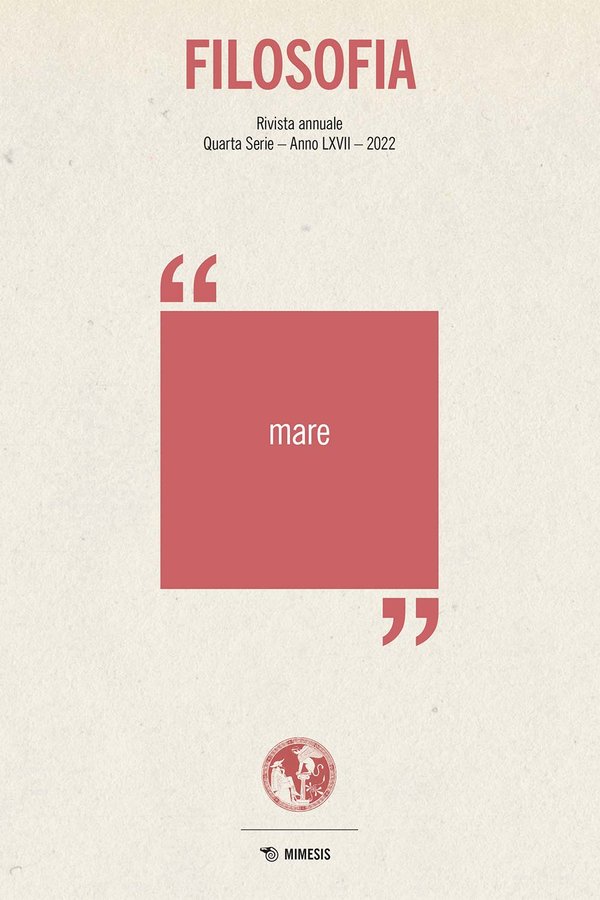Storie di isole, lacrime e sirene
I simboli pitagorici dal mare al cosmo
DOI:
https://doi.org/10.13135/2704-8195/7249Parole chiave:
Pythagoreanism, Symbols, Early Greek Cosmology, Ancient Hermeneutics, Early Greek PoetryAbstract
The early Pythagoreans committed some of their early teachings to orality, in the form of cryptic symbols. Following the hypothesis that some symbols could be an early form of exegesis of poetry, this paper examines some of those difficult witnesses of ancient Pythagoreanism, trying to explain them by their relationship with myths and poems focussed on the space of the sea, and Homer’s Odyssey in particular, showing that, far from being the realm of chaos and unlimitedness, the sea of the myth was generally understood by the Pythagoreans as a boundary land lying between this world and the afterlife, which is placed in the sky. This seems to lead to a better understanding of the symbols examined and brings further evidence of the importance of myth and poetry in early Pythagorean philosophy.
Downloads
Riferimenti bibliografici
Boyancé, Pierre. 1946. “Les Muses et l’harmonie des Sphères” in Mélanges dédiés à la mémoire de Félix Grat. 1. Antiquité, Moyen Age, l’Islam, Jeanne Vielliard, a cura di, 3-16. Paris: Pecqueur Grat.
Buffière, Felix. 1956. Les mythes d’Homère et la pensée grecque. Paris: Les Belles Lettres.
Burkert, Walter. 1961. “Hellenistische Pseudopythagorica”. Philologus 105: 16-43, 226-246.
Burkert, Walter. 1972. Lore and Science in Ancient Pythagoreanism. Eng. tr. Edwin Minar. Cambridge (Massachusetts): Harvard University Press.
Carcopino, Jerôme. 1956. De Pythagore aux Apôtres: études sur la conversion du monde romain. Paris: Flammarion.
Cumont, Franz. 1942. Recherches sur le symbolisme funéraire des Romains. Paris: Geuthner.
Delatte, Armand. 1915. Études sur la littérature pythagoricienne. Paris: Bibliothèque de l’École des Hautes Études.
Detienne, Marcel. 1962. Homère, Hésiode et Pythagore. Poésie et Philososphie dans le pythagorisme ancien. Brussels: Latomus.
Domaradzki, Mikolaj. 2013. “Sull’allegoresi simbolica del primo pitagorismo”. Peitho, Examina Antiqua 1 n. 4: 93-103.
Horky, Phillip Sidney. 2020. “Approaches to the Pythagorean Acusmata in the Early Academy” in Plato’s Academy: Its Workings and its History, edited by Paul Kalligas, Chloe Balla, Effie Baziotopoulou-Valavani, Vassilis Karasmanis, 167-187. Cambridge: Cambridge University Press.
Lanata, Giuliana. 2020. Poetica pre-platonica. Testimonianze e frammenti. Roma: Edizioni di storia della letteratura.
Livrea, Enrico. 1998. “A New Pythagorean Fragment and Homer’s Tears in Ennius”. The Classical Quarterly 48.2: 559-561.
Philip, James Allenby. 1963. “Aristotle’s Monograph on the Pythagoreans”. Transactions and Proceedings of the American Philological Association 94: 185-198.
Pfeiffer, Rudolph, ed. 1949. Callimachus, Fragmenta, Hymni et Epigrammata, vol. I. Oxford: Clarendon Press.
Riedweg, Christoph. 1997. “Pythagoras hinterliess keine einzige Schrift- Ein Irrtum? Anmerkungen zu einer alten Streitfrage”. Museum Helveticum 54 n. 2: 65-92.
Riedweg, Christoph. 2002. Pythagoras; Leben, Lehre, Nachwirkung. München: Verlag C. H. Beck.
Rose, Valentin, ed. 1863. Aristoteles Pseudepigraphus. Leipzig: Teubner.
Timpanaro Cardini Maria, a cura di. 2010. Pitagorici Antichi. Testimonianze e frammenti. Milano: Bompiani.
Thom, Johan Carl. 2013. “The Pythagorean akousmata and Early Pythagoreanism” in On Pythagoreanism, edited by Gabriele Cornelli, Richard McKirahan, Costantinos Macris, 77- 101. Berlin: De Gruyter.
Vernant, Jean-Pierre. 1974. Mythe et pensée chez les Grecs, II voll. Paris: Maspero.
Viltanioti, Irini-Fotini. 2015. L’harmonie des Sirènes du pythagorisme ancien à Platon. Berlin-Boston: De Gruyter.
Vítek, Tomáš. 2009. “The origin of the Pythagorean symbola”. La Parola del Passato 64, n. 4: 241-270.
Zaccaria Pietro, a cura di. 2021. Alessandro Poliistore, Die Fragmente der Griechischen Historiker Continued IVa, Biography, fasc. 5. Leiden-Boston: Brill.
Zhmud, Leonid. 2012. Pythagoras and the Early Pythagoreans. Eng. tr. Kevin Windle and Rosh Ireland. Oxford: Oxford University Press.
##submission.downloads##
Pubblicato
Come citare
Fascicolo
Sezione
Licenza
Filosofia applica una licenza Creative Commons Attribution 4.0 International License a tutto il materiale pubblicato.




